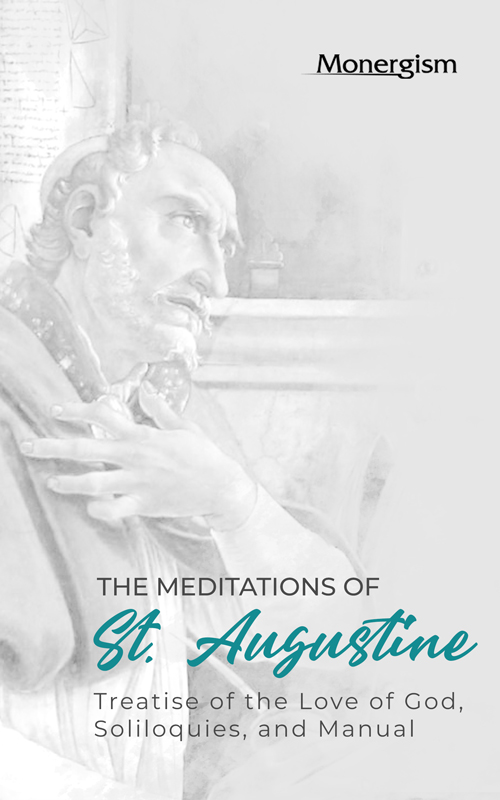 by St. Augustine
by St. Augustine
in .ePub, .mobi & .pdf formats
Lightly modernized, corrected, formatted, and annotated by William H. Gross, www.onthewing.org
Augustine (354-430) was often quoted by later reformers and Puritans, who pointed out that the doctrines of grace they asserted —salvation by grace alone, through faith alone, in Christ alone, standing on the authority of Scripture alone, to God’s glory alone — were not new. Augustine, as you’ll see in his Meditations, reveals these same principles. He laid a foundation for the Reformation, a millennia later, which enabled the Church to return to its scriptural roots—these roots.Augustine’s best-known works are his Confessions (c. 400),and The City of God (c. 413–426). I think this deserves to be named with them. It is his devotional. It is a passionate and clear celebration of God’s Plan of Salvation, and of the Trinitarian God. It emphasizes our disabled condition in a way that will be surprisingly familiar to any reformed Christian. If you’ve read Spurgeon’s devotional, Morning and Evening, you may find the styles very similar. Being a collection, it’s hard to say when Augustine wrote these meditations; but certainly some of it was done towards the end of his life. This edition of Meditations was translated from the Latin by George Stanhope in 1701, and printed in 1818. Latin is not the easiest of languages to translate.To convey its poetry, takes a skilled linguist and a gifted writer. Stanhope has taken Augustine’s personal meditations, and converted them into a form that transports the reader into the heavenlies. Rarely is a private conversation with God recorded in such away that the reader may join in that worship. I believe Stanhope succeeded in doing that, by preserving for us the splendor of Augustine’s words and speculations.George Stanhope (1660-1728) was Dean of Canterbury and a Royal Chaplain. He was a leading figure in church politics in the early 18th century. He was one of the great preachers of his time, and preached before Queen Anne in St Paul's Cathedral in 1706 and 1710. The challenge in modernizing Stanhope’s language of three hundred years ago, was to retain, as he retained, the substance of Augustine’s work, while remaining faithful to its poetic character. Wherever possible, I preserved his wording, along with the rhythm of his prose, even as I updated the vocabulary and syntax. Whether I succeededor not, is for the reader to judge. What may seem to be run-on sentences, punctuated by semi-colons, colons, and dashes, might have been better formatted into stanzas; but that’s not how Stanhope formatted it for his publisher. He italicized versesto distinguish them from Augustine’s words, and added verse references. I included additional verse references. I also italicized as needed to aid readability. Some of the sentences were very long; the punctuation lets the reader take a breath as he reads.Now, I can’t say if Stanhope substituted the wording of the King James, Douay-Rheims, or Geneva bibles for Augustine’s (e.g. “farthing” on p. 271), or if Augustine’s wording was itself taken from Jerome’s Vulgatec. 405. But I don’t think it matters: its inherent truth and beauty areof God, not man. I pray that this little book affords you, as it did me, many joyous hours of introspection, meditation, and worship.
William H. Gross
May 25, 2019
-----
TABLE OF CONTENTS
Editor’s Preface
Dedication
Book I. AUGUSTINE’S MEDITATIONS
CHAP. 1. A Prayer for Reformation of Life.
CHAP. 2. An Act of Self-accusation, and imploring the Divine Mercy.
CHAP. 3. The Sinner’s Lamentation for his Prayers not being heard.
CHAP. 4. An Act of Fear.
CHAP. 5. An Address to the Father in the Son’s Name.
CHAP. 6. The Son’s Sufferings represented to the Father.
CHAP. 7. An Acknowledgment that sinful Man was the Cause of Christ’s Sufferings.
CHAP. 8. The Soul’s Application of Christ’s Death and Sufferings to herself by Faith.
CHAP. 9. A Prayer to the Holy Ghost.
CHAP. 10. An Act of Humility.
CHAP. 11. A Prayer to the Holy Trinity.
CHAP. 12. A Confession of God’s Omnipotence and Majesty.
CHAP. 13. Of the Incarnation of the Divine Word.
CHAP. 14. An Act of Trust in, and Thanksgiving for, Christ and his Sufferings.
CHAP. 15. Of God the Father’s Love to Mankind.
CHAP. 16. Of the Two Natures in Christ.
CHAP. 17. Of the Thanks due to God for the Redemption of the World,
CHAP. 18. A Devout Prayer to Christ.
CHAP. 19. The Souls of the Righteous are the House of God.
CHAP. 20. The Pious Soul’s longing for Heaven.
CHAP. 21. The Miseries of the Present Life.
CHAP. 22. The Happiness of that Life prepared for those who love God.
CHAP. 23. The Happiness of holy Soul’s at their Departure out of this World.
CHAP. 24. A Prayer for Succour in Trouble and Danger.
CHAP. 25. The pious Soul’s Desire of Heaven.
CHAP. 26. An Act of Praise.
CHAP. 27. How God may be seen, and possessed by Man.
CHAP. 28. How God may be Praised.
CHAP. 29. Of the Plurality of Persons in the Unity of the Divine Essence.
CHAP. 30. A Prayer to the ever-blessed Trinity.
CHAP. 31. God the True Life.
CHAP. 32. The Praises of Angels and Men.
CHAP. 33. A Prayer for Zeal in the Service and Praise of God.
CHAP. 34. An Act of Devotion and Love of God.
CHAP. 35. A Devout Prayer to Christ.
CHAP. 36. Another Prayer to the same Purpose.
CHAP. 37. A Prayer in Time of Affliction.
CHAP. 38. A devout Prayer for Pardon of Sins.
CHAP. 39. A Useful Prayer.
CHAP. 40. Devout Reflections upon the Sufferings of Christ.
Book II. OF THE LOVE OF GOD.
CHAP. 1. Narrow the Way that Leads to Life.
CHAP. 2. Upon what accounts, and in what manner, we ought to love God.
CHAP. 3. How God made all Things for Man.
CHAP. 4. Of the Love of God towards us.
CHAP. 5. Of the Fruition of God.
CHAP. 6. The Mercies of Creation and Regeneration.
CHAP. 7. The Mercy of being called to the true Faith.
CHAP. 8. Of the Communications of Divine Grace.
CHAP. 9. The Mercy of Instruction and Illumination.
CHAP. 10. God’s tender Care and constant Presence with us.
CHAP. 11. The Benefit of our bodily Senses, and the preservation of our Lives.
CHAP. 12. God’s long-suffering and Mercy which preserved us from, and forgave us after, the commission of sin.
CHAP. 13. The Power of Mastering Temptations.
CHAP. 14. The Benefit of a Holy Hope.
CHAP. 15. The many Instances of God’s Bounty, notwithstanding our Sins, and the Thanks due to him on this Account.
CHAP. 16. Of the Death of Christ.
CHAP. 17. The Promises of God.
CHAP. 18. The Happiness of a Future State
Book III. Select Meditations out of AUGUSTINE’S SOLILOQUIES.
CHAP. 1.
CHAP. 2.
CHAP. 3. The Misery of Unregenerate Man.
CHAP. 4. An Act of Praise for God’s Manifold Mercies in Man’s Present State.
CHAP. 5. The Excellency of Man’s Future State.
CHAP. 6. Of the Almighty Power of God.
CHAP. 7. A Prayer for the Divine Grace and Protection.
CHAP. 8. A Prayer against Evil Desires.
CHAP. 9. Of God’s seeing all the Actions and Intentions of Men.
CHAP. 10. The Impotence of Human Nature to resist Temptations, without the Assistance of Divine Grace.
CHAP. 11. The manifold Goodn
CHAP. 11. The manifold Goodness of God, and what Improvement we should make of it.
CHAP. 12. The Consideration of the Divine Goodness: our hope and comfort in Sufferings.
CHAP. 13. The Methods of God’s Grace in our Sanctification and Salvation.
CHAP. 14. We are not to conceive God to be a sensible Object.
CHAP. 15. A Confession of our Vileness and God’s Excellences.
CHAP. 16. The Soul’s earnest Longings after Future Happiness.
CHAP. 17. A Concluding Prayer to the Holy Trinity.
Book IV. AUGUSTINE’S MANUAL
The Preface.
CHAP. 1. The Excellences of the Divine Essence.
CHAP. 2. The inexpressible Perfection of the Divine Knowledge.
CHAP. 3. The Thirst of the Soul after God.
CHAP. 4. The Misery of those who do not seek and love God,
CHAP. 5. Prayer for Grace to love God above all Things.
CHAP. 6. The Happiness of Souls delivered from their earthly Prisons.
CHAP. 7. Of the Comforts afforded good Men under their present Trouble.
CHAP. 8. An Act of Love and Devotion.
CHAP. 9. The Pleasure of Meditating upon God.
CHAP. 10. Of loving God, and the Advantages of doing so.
CHAP. 11. The good Effects of meditating on Christ’s Death and Sufferings.
CHAP. 12. Of the Knowledge of the Truth.
CHAP. 13. The Marks and Fruits of true Love.
CHAP. 14. The exquisite Goodness of God.
CHAP. 15. The Happiness of the Saints hereafter.
